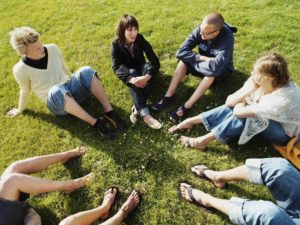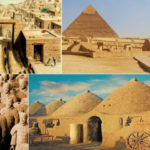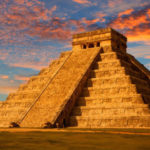Interesting facts about paganism and pagans
 Paganism is often associated with polytheism. The belief in many gods that arose in primitive times subsequently led to the creation of a pantheon of gods with family ties between them, the formation of mythology, rites and holidays. Until now, many nations profess pagan cults, worship wooden idols, believe in the gods of the sun, wind, the kingdom of the dead, etc. World religions, including the Russian Orthodox Church, are extremely negative towards neopaganism. In this article we want to talk about the 20 most interesting facts related to paganism, pagan gods and peoples who believed in many gods.
Paganism is often associated with polytheism. The belief in many gods that arose in primitive times subsequently led to the creation of a pantheon of gods with family ties between them, the formation of mythology, rites and holidays. Until now, many nations profess pagan cults, worship wooden idols, believe in the gods of the sun, wind, the kingdom of the dead, etc. World religions, including the Russian Orthodox Church, are extremely negative towards neopaganism. In this article we want to talk about the 20 most interesting facts related to paganism, pagan gods and peoples who believed in many gods.
Neptune was the god of the seas among the ancient Romans. Once the Roman emperor was angry with this pagan god and ordered his subjects to throw spears into the water. The Romans obeyed the cruel ruler and showered the sea with a hail of arrows.
The pagans made images of the deity from stone, wood and animal bones. These idols stood in various places, they prayed and made sacrifices to appease God. The gods of the eastern Slavs performed not one function, but were multitask. For example, Veles patronized livestock and led the world of the dead.
Pagan ideas arose in primitive times. The names of the gods of that period were not preserved due to the lack of writing among the most ancient peoples and tribes.
The Komi people have a legend that the Christian missionary Stefan of Perm came to the Komi lands in the XIV century to fight the pagans and plant Orthodoxy. He walked his way through the ancient village of Ib in an unusual way: he sailed on a huge stone along the Sysola River against the current. This is just a legend, but historical documents say that the future bishop assiduously destroyed pagan idols.
The ancient Romans at the outbreak of hostilities addressed pagan prayers to the gods of the enemy state. These ceremonial actions in science are called “evocation.” Today, Russia is a predominantly Christian state, most of the population professes Orthodoxy. But being baptized, people still enjoy celebrating the first spring holiday – Shrovetide, which has pagan roots.
The ancient Slavs waited for the arrival of spring and for a whole week indulged in fun in honor of the onset of warm days. They ate pancakes, glorified the sunny Yarilo God, burned a scarecrow of boring winter, rode horses and sledges from the mountains, went to visit each other. Much of this has been preserved to this day held during the Maslenitsa festivities.
The ancient Greeks had 12 Olympian gods. One of the most interesting pagan gods of the Hellenes was Hephaestus and Hades. The blacksmith God Hephaestus was raised to Olympus in infancy, but caused the wrath of his mother and was thrown into the underground grotto by her. Raised deep underground by the Nereids and their father – the sea king Nerey, he returned to Olympus and married Aphrodite – the most beautiful of the goddesses. And the god of the underworld Hades was the brother of the god of thunder Zeus. The dead people had to get into the underworld of Hades, bypassing the underground river Styx with the help of the elder Charon. Charon was the son of Night and owned a shuttle for crossing the souls of the dead, but for this he needed to pay a ransom. Therefore, the ancient Greeks put a small coin into the mouth of the deceased – obol.
Across the river of death sat the evil dog Cerberus with three heads, who angrily attacked all who entered. Having passed this test, the dead finally came to Hades. The Baptist of Russia, Prince Vladimir the Red Sun in his youth was a zealous pagan. Historical sources also say that he ordered people to be sacrificed to the gods. Old Russian chronicles repeatedly mention such cruel sacrifices. And the Kiev prince Vladimir himself, who received another nickname – the Holy – after the baptism of Russian lands in 988, began to brutally crack down on pagan shrines. The idols of the god Perun (among the Eastern Slavs it was a thunder god, one of the main gods of the pagan pantheon) were burned or thrown into the waters of the Dnieper.
The ancient Slavs on Thursday prayed especially strongly to the god Perun, since Thursday was a perunian day. But God did not seem to hear pagan prayers, did not fulfill the requests of people. Our ancestors were angry at the capricious and greedy for the pleas of the people of God. They began to say that pipe dreams would happen after Thursday’s rain. This expression has become winged in modern Russian. In Russian there is an expression “apple of discord.” He came to us from Greek mythology. The Greeks had the goddess of contention Eris. Once she decided to cruelly make a joke on three goddesses: Aphrodite, Athena and Hero. Eris took an apple with the inscription “The Most Beautiful” and tossed it. Three goddesses began to swear over this apple. Each believed that she was the most beautiful and beautiful of the goddesses.
Aphrodite became the happy owner of the apple, which she received from the hands of a guy named Paris. And the argument itself led to the start of the Trojan War. Nowadays, the phrase “apple of discord” means that because of an insignificant thing, a grand catastrophe occurs. After the Christianization of Russia, the Slavs for a long time, up to the sixteenth century, wore so-called serpentines on their necks. They were made of stone or metal, and were amulets, on the visible side of which were images of scenes from the New Testament.
But the invisible side included a picture from pagan stories, for example, from ancient Greek mythology about Medusa Gorgon. During their excavations, archaeologists found many serpentines with a pagan image, especially many different snakes were depicted there. Certain plants or animals were connected with the ancient Greek gods living on the top of Mount Olympus. Herald of Zeus was considered an eagle, which was constantly at his feet. The snake and the owl were the sacred animals of the goddess Athena. A significant role in the cult of Apollo was played by the laurel tree. The god of winemaking Dionysus was associated with the vine, and Persephone had a close relationship with poplar. Scientists suggest that this was due to the pre-Olympic beliefs of the Hellenes, when the Greeks believed that stones, animals and plants possess supernatural powers.
The voodoo religion originated on the African continent in ancient times and is still considered the state religion of some African countries. In traditional voodoo, there is priesthood and secret rites. Voodoo – these are ritual dances near the fire, amulets and talismans, sacrifices, witchcraft rites and mystical music. Only the elite who transmit the gift and knowledge by inheritance are dedicated to the Voodoo religion. In Africa, priests are still often turned to the services of priests, which can benefit a person, for example, to attract money or love, but they can also do evil. It is hard to say whether the truth or the fiction is the story of how voodoo priests punctured the image of a person in the form of a doll by the order of his ill-wisher, and this person subsequently died.
Ancient people believed in the soul – a special power that exists in every person, animal and plant. The soul was a certain attribute of a living being. Dreams and the soul were also considered interdependent, because the soul was active precisely at night. According to ancient beliefs, the soul leaves the body at night and communicates with other souls. Observations of blood led primitive people to a new conclusion: blood is the bearer of the soul, and loss of blood or death meant the exit of the soul from the body. For divine services and pagan cults in the first civilizations began to build temples. These were places of worship where magnificent ceremonies were held.
Temples were considered the dwelling place of God, and special people – priests – performed ritual rites. For example, in ancient Egypt, ordinary Egyptians were not allowed to enter the sacred places of the temple, but they were allowed to bring offerings to the gods and hear prophecies. Historical documents state that the priests did not believe in gods, many of whom they themselves invented. And food and drinks from the Egyptian people as a gift to the gods, the priests themselves ate on both cheeks, mocking the naivete of the people. And in the morning, the priesthood announced to people that a powerful god came at night, tasted the food presented to him and promised to hear the prayers of the people.



























